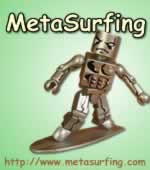Silicon Valley is mostly a world of practical technology—applying principles from pure science to create handy gadgets. But today, Hewlett Packard announced a new electrical component born of theoretical physics. The device, a nanoscale component called a "memristor," requires no power to retain data, which it can store more densely than a hard drive and access about as fast as a computer’s RAM memory—potentially allowing it to replace both components in the future.
Memristors can function in either a digital mode, in which a memory cell is “on” or “off,” or in analog mode, in which each cell holds some value in between. These values grow every time the cell receives an electrical signal, mimicking the way neurons in the brain build stronger memories the more they are stimulated.
The memristor was theorized in the early seventies by an electrical engineer name Leon Chua, but it took decades before anyone could prove it exists. The process was similar to particle physics, in which mathematicians first propose a particle and then experimenters eventually find it—or don’t. (The hottest current example is the search for the theoretical Higgs boson, aka the “god particle.”) Chua’s mythical electrical component didn’t show up until recently when HP researchers were studying the electrical properties of nanoscale materials and came upon a few that acted suspiciously like the memristor. After some refinements, they invented exactly what Chua theorized.
More.

No comments:
Post a Comment